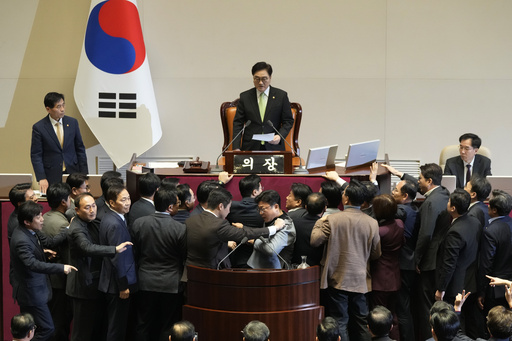
SEOUL, South Korea — The National Assembly of South Korea, predominantly led by the opposition, has taken a decisive step by voting to impeach acting President Han Duck-soo on Friday. This comes amidst an escalating political crisis triggered by President Yoon Suk Yeol’s extraordinary martial law order and the subsequent impeachment motion he faced.
As a result of the impeachment, Han has lost his presidential powers until the Constitutional Court determines whether to uphold or reject the measure. This court is currently reviewing the impeachment of Yoon himself. The impeachment of both top officials has intensified political unrest, brought about economic uncertainties, and posed a threat to South Korea’s international standing.
The National Assembly voted overwhelmingly in favor of Han’s impeachment, with all 192 lawmakers present backing the motion, while members of the governing People Power Party (PPP) chose to boycott the proceedings. In protest, they surrounded Assembly Speaker Woo Won Shik’s podium, asserting that the vote was illegitimate and demanding Woo’s resignation. Fortunately, the situation did not escalate into violence or injuries.
The PPP expressed their dissent after Speaker Woo declared that a simple majority was sufficient for the impeachment of Han, contrary to their assertion that a two-thirds majority was necessary. Although most South Korean officials can be impeached with a simple majority, the impeachment of a president typically requires a supermajority. There are, however, no specific regulations governing the impeachment of an acting president.
In response to his impeachment, Han expressed regret over the situation but maintained respect for the assembly’s decision. He announced he would suspend his duties, emphasizing a desire to avoid further chaos and confusion and stated he looked forward to a prompt and judicious ruling from the Constitutional Court.
Following the impeachment proceedings, Han’s duties were suspended once official documents were delivered to him and the Constitutional Court. As a result, the deputy prime minister and finance minister, Choi Sang-mok, stepped in to assume his responsibilities. Choi also communicated directives to the military to ensure heightened readiness in case North Korea misinterprets the political situation, while assuring international partners that South Korea’s foreign policy remains steadfast.
Han Duck-soo, previously appointed Prime Minister by Yoon, transitioned to the role of acting president after Yoon’s impeachment just two weeks earlier, stemming from Yoon’s brief enforcement of martial law on December 3. Han quickly found himself at odds with the opposition Democratic Party, who aimed to fill three vacant Constitutional Court positions, investigate Yoon’s martial law declaration, and pass legislation benefiting farmers.
A key point of contention lies in the Democratic Party’s insistence that Han approve nominations for three new justices to restore the full nine-member panel of the Constitutional Court before it rules on Yoon’s impeachment. This is politically sensitive, as a dismissal of Yoon requires the consensus of at least six justices, and adding more justices may increase the likelihood of his removal. Han’s allies within the PPP oppose these appointments, arguing that he should not exercise presidential powers while Yoon remains in office.
On Thursday, Han declared his reluctance to appoint justices without bipartisan support. Later that day, the Democratic Party, which commands the assembly majority, submitted an impeachment motion against Han and approved bills advocating for the appointment of the three justices.
Ongoing investigations have focused on allegations of rebellion and abuse of power against Yoon concerning the martial law order, with Yoon prioritizing engagement with authorities over in-person inquiries. Top military officials, including the defense minister and police chief, have already faced arrest due to their deployment of security forces during the tumultuous events at the National Assembly, which ultimately led lawmakers to override Yoon’s decree through a unanimous vote.
In addition, South Korean media reported the indictment of former Defense Minister Kim Yong Hyun for allegedly playing a prominent role in Yoon’s rebellion plan and for committing abuse of power. The reports emerged confirming Kim’s status as the first individual to face formal charges concerning the martial law decree.
Han’s impeachment motion accuses him of colluding with Yoon in the martial law declaration and obstructing the re-establishment of the Constitutional Court’s complete membership. It further alleges that Han has hindered investigations into Yoon’s alleged insurrection by failing to appoint independent special prosecutors. The martial law order, unprecedented in South Korea for over four decades, was enacted for only six hours but incited significant political upheaval, raised alarms among neighboring countries, and unsettled financial markets. Yoon has defended the action as a crucial governing measure, portraying it as a warning to the Democratic Party for allegedly obstructing his administrative agenda.

